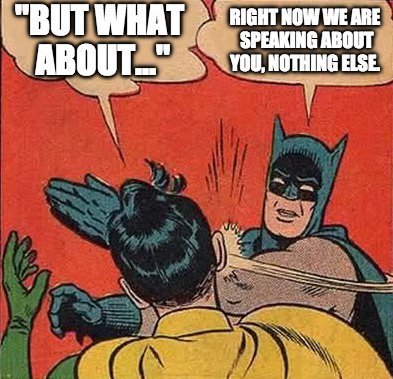Whataboutism is essentially a reversal of accusation.
It’s arguing that an opponent is guilty of an offense just as egregious or worse than the one you are talking about.
Whataboutism gives a clue to its meaning in its name. It is not merely the changing of a subject (“What about the economy?”) to deflect away from an earlier subject as a political strategy.
It’s essentially a reversal of accusation, arguing that an opponent is guilty of an offense just as egregious or worse than what the original party was accused of doing, however unconnected the offenses may be.

Here’s a more basic look at whataboutism in daily life.
When you deflect criticism by pointing out flaws in your opponent, specifically using the phrase “what about x?”
This is an attempt to excuse you from changing you behavior by painting your opponent as a hypocrite or simply purely focus on your own feelings and opinions rather than actually listening.
Examples…
John: Hey Sarah, why didn’t you call me yesterday when you said you would?
Sarah: What about you? You never call me when you say you will!
Peter: Excuse me, but you can’t park over there.
Random person: What about you? Your can is touching the line so you should just back up.
Sebastian: Listen Betty, I really didn’t like the way you treated my friend yesterday. I don’t think it was fair.
Betty: Oh whatever man! What about you? You never even ask about my friends.
Julius: Sorry Mr Boss, but I feel you were a bit too hard on me yesterday when I shared my situation yet still expected certain tasks from me.
Mr Boss: Julius, what about all the times I did allow you to be at the office a few days late?

Get it?
During the next week I’d like you to pay attention to this concept.
It happens a LOT more than you would think and you might even do it yourself without being aware of it.
Even a normal conversation about the news can be totally whataboutism-ified.
Person 1: Hey, did you hear about the horrible accident that happened on the N1 yesterday?
Person 2: Yeah, but did you see how the shit in Ukraine is playing out?
You’ve seen the quotes about how some people don’t actually listen but simply wait for their turn to talk?
Well this is something like that.
Instead of addressing a complaint or opinion and trying to find possible solutions, the conversation just goes around in circles.
This can obviously be pretty problematic and, to be frank, pretty damn frustating.
The following few tips may help you when responding to whataboutism.
If you agree with the gist of the counter-argument but still want to expose it as whataboutism, you can respond: “You’re right, that’s also a problem. However, I’d like to get back to the topic at hand.”
If a counter-argument is factually incorrect, it’s best to respond with data or scientifically proven facts but the other person might just stick to a broken record type approach to the conversation. #Frustrating
Most importantly, stay calm! Try not to take the attack personally, just keep the facts in mind. If they’re using whataboutism tactics, you’ve technically already won, they’re just too stubborn to agree and move on. Just stick to the topic and continue to communicate calmly and rationally.

If we don’t listen to someone else’s issues, challenges or opinions how can we ever really connect with them?
How can we ever learn more and understand more?
How can we make a difference to any given situation or conversation?
How can we broaden our own minds and opinions?
So this week, as you go through your normal day to day life, be aware of conversations – with people, in groups, on the news and especially on social media – and I think you might be surprised how often you’ll see and possible experience whataboutism.
Kinda feel that this is the kind of thing – how to properly communicate and listen – we should be teaching kids at school.
But hey, maybe it’s just me. 🤷♂️
G.
✌🏼
















